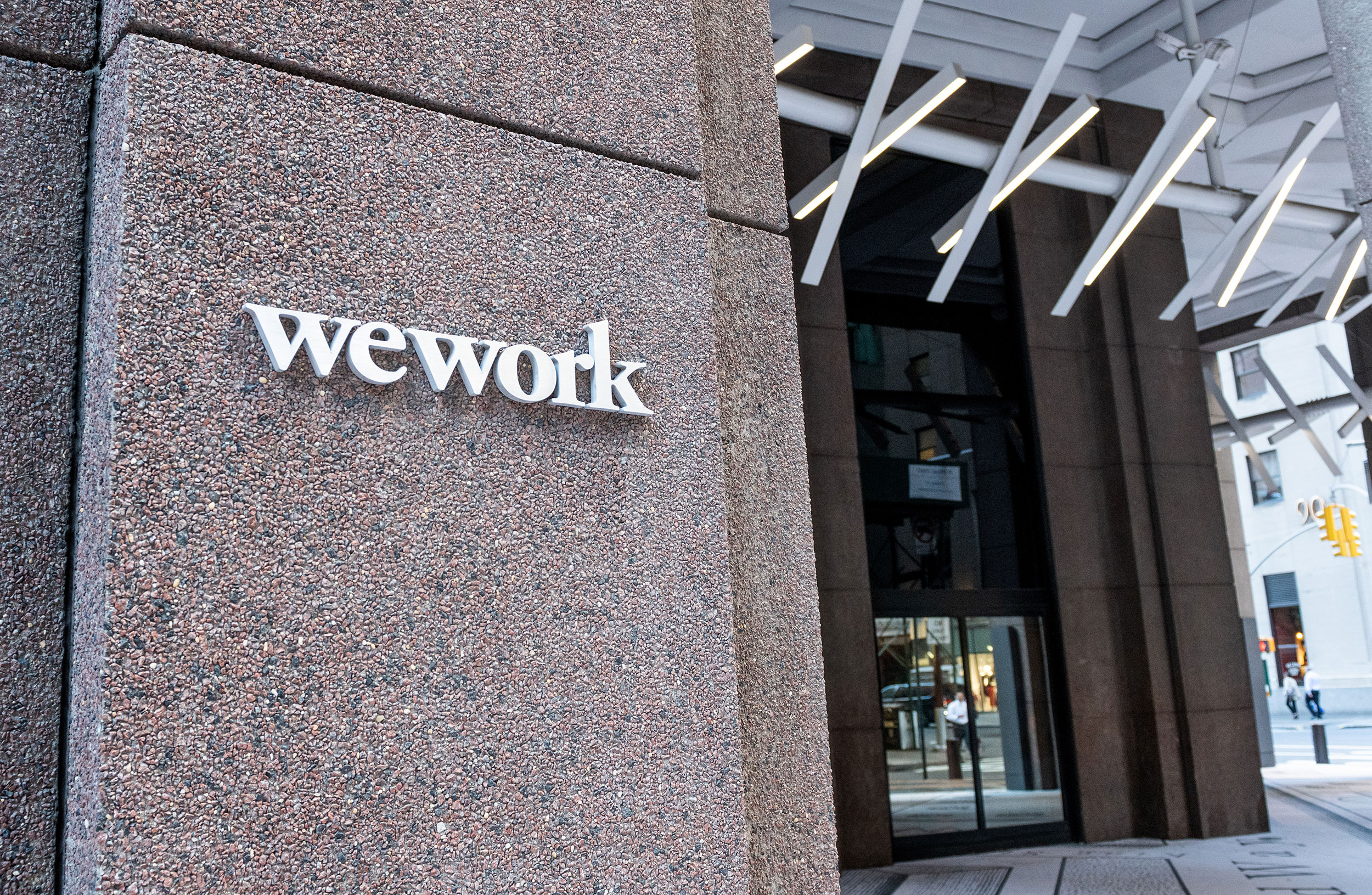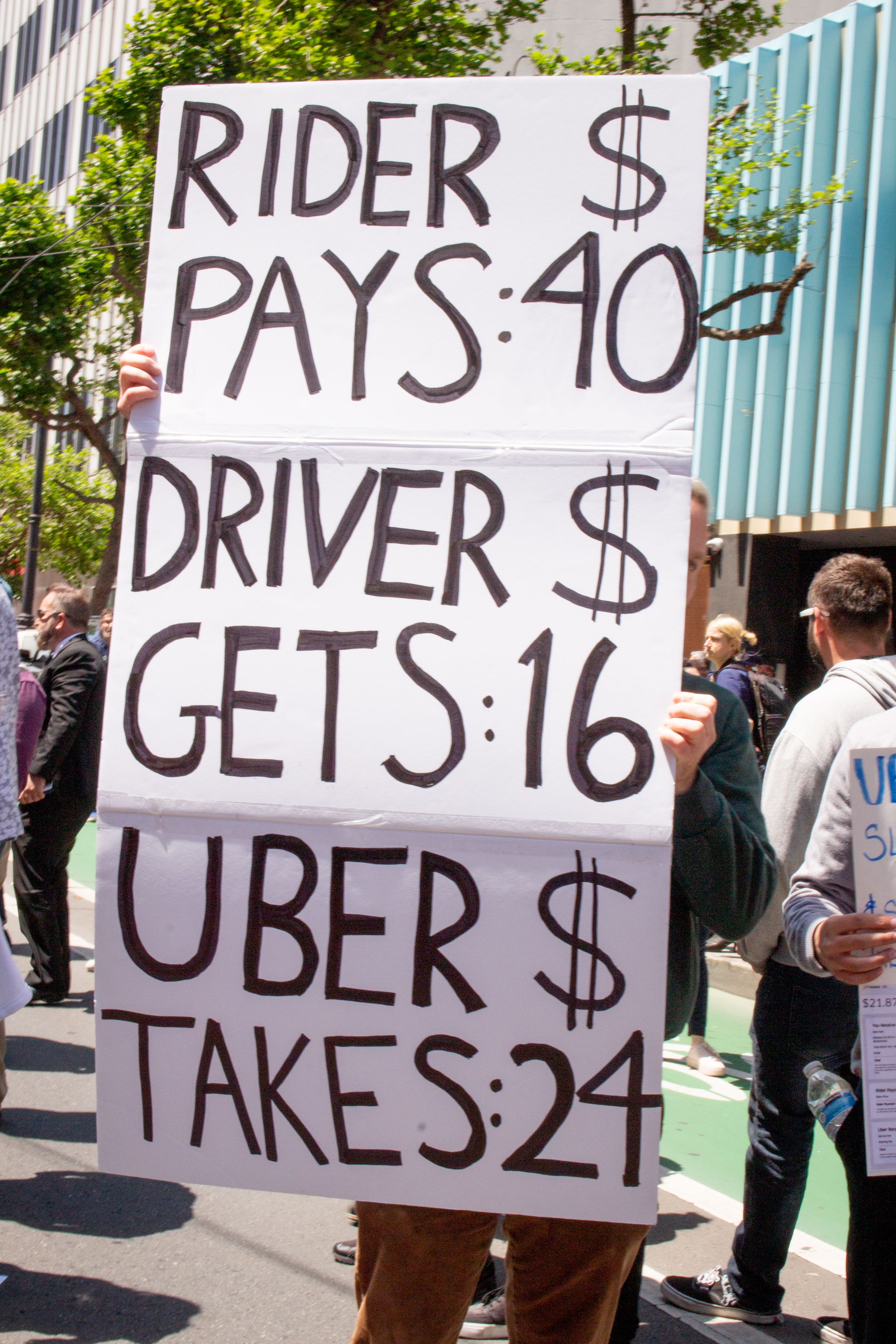Some weeks, tech ethics is in the news. And some weeks, it IS the news. This week was one of the latter.
There were so many ethically fraught news stories about technology companies over these past few days, I had trouble keeping track of them all. So I’m delighted that my latest interviewee for this series on ethics and technology is TechCrunch’s own Kate Clark, a reporter covering startups and venture capital.
Kate is one of the tech reporters on whom I rely most heavily for insight into what the hell is going on in Silicon Valley, and not just because she’s prolific, a fine writer, and so hardworking she seems to attend every VC dinner and startup product launch in Northern California (though she is all of those things).
I also turn to her (well actually, I turn to her Twitter — we’ve never met in person) because, though she would never claim to have any special training or authority in ethics, she has three of the top qualities I look for in an ethical leader: a passion for equitable inclusion; a well-modulated bullshit detector; and enough compassion for humanity to expect better of us all.
When Kate and I spoke on Wednesday afternoon, she was as harried as you might expect, at least based on her tweets.
Alright anyone else that tries to generate headlines today is selfish and rude and must be stopped!!!
— Kate Clark (@KateClarkTweets) September 25, 2019
Greg Epstein: I’ve been looking forward to talking to you for a while now, and I certainly picked a busy day.
Kate Clark: Not as bad as yesterday.
Epstein: I follow your work closely; it informs mine. I’m sitting here in Cambridge, Massachusetts, where I work, and I’m thinking about the ethics of technology.
But I’m not in the Bay Area. I’m not part of that culture. The people who create that culture don’t necessarily want to talk to me as much as they want to talk to you, for very good reason.
And when I read your writing and tweets and the Equity podcast, I hear somebody who is tapped into what people are thinking — for better and for worse. So on a huge tech news week like this one, I want to see what happens if we just try to talk about all these different stories from an ethical perspective.
But where to start, right?
Over the past several days we’ve had a national scandal over Adam Neumann, the now-former CEO of WeWork, or WeChrist as some have called him (or even WesUs if you like that pun a little better). I mean, what a classic example Neumann is of “The Cult of the Founder,” a theme the tech world has been buzzing about lately regarding more companies than I could list.
Then there were the sort of bizarre Amazon and Facebook product launches (“Have you ever wished your glasses were not only uncool but also transmitting everything you say to a giant corporation run by the world’s richest man?,” quipped CNN writer Amanda Katz). There were Google contract workers voting to unionize in Pittsburgh; Uber was in the news for at least three different types of ethical violations, one involving the misuse of something called “God Mode.”
There was the “Peloton Cult,” as our colleague Josh Constine wrote about; the CEO’s of Juul, eBay, and a bunch of other famous companies also stepping down; there was Vox, which is basically a tech company, merging with New York Magazine; plus the lingering effects of all sorts of other recent events, like for example you commented recently on VC investment exploding in Latin America, which seems to have gone under the radar, but is huge from an ethics standpoint because to me it basically screams, “Colonialism 2: Electric Boogaloo.”
And all of this taking place during, generally, ‘one of the craziest years in VC history,’ as I think you wrote?
Clark: Yeah.
Epstein: And then there are just these bizarre experiences that keep happening in the tech world, like at one point a few weeks ago you got invited to a VC event and you were the only woman there? Or one or two women there?
Clark: Yeah. Both have happened.
Epstein: Aaaand let’s just set aside tech people going nuts over the idea of impeachment, the Jeffrey Epstein scandal, tech for ICE, emergency climate meetings at the UN, and on and on, right?
So here’s where I want to start: on a recent podcast of Equity, you mentioned that you’ve been hearing all about mental health. I assume you meant mental health startups, not just that people are coming to you for therapy, though I assume that’s happening too.
Nellie Bowles recently wrote about anxiety in Silicon Valley for the New York Times, covering a lot of interesting ground. I had a column recently with Desmond Patton, a professor of social work at Columbia; I call him the “Chief Social Work Officer” for big tech; we discussed many reasons people in tech might need someone to talk to. And I decided to speak with Patton because of something Prayag Narula, founder of LeadGenius, said to me on Twitter: that “behind the hubris and Machiavellianism one can find in tech companies, is a constant struggle with anxiety and an abiding feeling of inadequacy among tech leaders.”
I know you’re not a mental health expert, but I’d like your sense as someone who gets to observe tech leaders closely: how are people doing?
Clark: People in the Valley [and the Bay area] are actually very open about mental health. I think that’s why we’re seeing more investment in mental health companies, because people are willing to engage and have these discussions with colleagues, bosses, friends, coworkers, and peers. So that’s been a really good development.
The thing is, there’s so much hustle porn here too. I think the two of those things run into each other and make it difficult to really have one clear message because on the one hand, you’ve got a number of [mental health] tools to help tech workers specifically. And on the other hand you still have the expectation that people work 80-hour works. They’re up until 2:00 AM working.
Epstein: In your subjective experience, to what extent are people aware that they really are kind of the elite of the elite in the world right now?
Clark: It depends. Occasionally on Equity or whatever it may be, you do have a conversation with someone and they’re very forthcoming [and] aware of their wealth. But on the other hand, I was at a dinner last night and some guy was telling me about his three houses and all these things I didn’t ask about, that make it obvious he’s aware of just how different he is from the normal population.
Overall they’re not particularly perceptive and aware. But there are people that are; I think that’s great and I hope more people are cautious and try to have some awareness, because of the whole 99% thing.
Epstein: It could be either way with a guy who starts telling you he’s got three houses: either he’s aware of how fortunate he is and you’re just having a conversation about that, or he’s really insecure and feels the need to tell you about it. Knowing nothing else, I would probably guess it was the latter, but hopefully it was the former.
I’m asking because a lot of people perceive ethics, whether in tech or anything else, to be about in sort of very specific policy changes, like what product Facebook, or Amazon, or whomever is putting out and whether the settings are properly calibrated to preserve the right amount of privacy.
Those issues are important, but when I think of ethics the real questions are, for example, what standard of living should most people have, and how do we get to that point? On your beat, you cover people who are becoming so rich in these industries.
And I mean, I know it’s complicated to criticize them for that because there are a lot of so-called economic progressives in tech leadership. It’s even been written that Alex Karp of Palantir is a socialist in some weird way. So I don’t want to beat a dead horse and say, “Oh, are people in the Valley aware of the need for more economic justice?” Because in various ways they obviously are.
What I’m getting at in tying together mental health and economic justice is people are often troubled in terms of their mental, and what you might call spiritual health — I mean, I’m an atheist, but spiritual in a generic non-supernatural sense — when they’re ambivalent. When they feel forced to believe two opposite things at once. I’m picturing people who on the one hand are believers in liberal equality, and justice for all. But on the other hand, they’re in a position to make so much money by increasing the degree of separation between themselves and their peers, and everybody else. And people probably have a sense that with the level of inequality we’re living through, some kind of reckoning is on the horizon, but nobody knows whether it’s coming up sooner or later, right?
Clark: Yep.
Epstein: So what’s your experience with all of that? You’re sitting at the tables with the people that I’m talking about. You know them better than I do.
Clark: I try to remind myself that VCs in particular have very different incentives than the founders often do and obviously [than] consumers. So when it comes to mental health, I’m pretty skeptical of all the companies being funded. Are they making the entire process more expensive for consumers by creating some kind of telemedicine product? Or do they make the whole thing more efficient and somehow cut costs? Which is really what we would need in the space, more so than we need new age, well-decorated brick and mortar clinics, which some startups are actually doing.
It’s important to be skeptical because VC’s want to reap big returns through [mental health startups]. And this is the opportunity because an increasing number of people are turning to [those startups], and that’s too bad. It may be a trend more in the Valley, I don’t know what the trends are in mental health in the US as a whole or beyond. But I think that [VC’s] are seeing people here talk about it and thinking, “Well, there’s an opportunity, there’s a big market. And we can make money.”
Epstein: I’ve tweeted with you about how people send you every pitch, for every single one of these companies.
Clark: Yeah. [My job is] kind of being a gatekeeper, because we all get a ton of pitches and I always have a sense of what areas companies are building. Mental health has certainly been one of those spaces, for at least the last year.
Epstein: What are some of the most interesting concepts you’ve seen, for better or worse?
Clark: I wrote about a company called Basis; they shut down a few months after I wrote about them; [they were] an interesting use case because this was a company relying on telemedicine for therapy, but they were hiring paraprofessionals, rather than licensed therapists. I think that model does not work. And [their shutdown] is just evidence it didn’t work, right? They couldn’t attract people to pay.
There’s a company called Two Chairs, which I think is doing brick and mortar clinics. I don’t really have an opinion, I don’t know what sets them apart, except that I think they try to be more accessible. They try to get you in versus making you wait six months for an appointment.
Then there’s Headspace and Calm, which I think are ultimately not going to work as businesses, because they rely on people who forget to cancel their subscriptions. I don’t think any business that does that has long term value.
From a business perspective, we don’t know if any of [these mental health startups] will work. So a lot of [VC’s] are probably like, “Oh, I’ll make a few bets and just learn from the bets.” Rather than make a few bets expecting those companies to become unicorns.
Epstein: Very interesting. I suspect a lot of therapy startups have business models that would actively make therapy worse. The idea that you can do online or text-based therapy as a replacement for what therapy actually is, is highly, highly questionable.
And even in-person therapy with these kinds of quantifiable “extras” that you can add software for, like your therapy app pings you a question or an exercise between sessions, or whatever. It’s no substitute for reflecting on yourself. It’s no substitute for talking and sitting with who you are as a human being and what you feel, and why you feel it. And I strongly suspect features like that can actually distract from the real work of therapy.
Ultimately I don’t think the therapy model will ever be “scalable” in the sense that venture capital would want it to be, which is fine. Why does every form of human interaction have to generate massive profits?
And in terms of the mindfulness apps, to me there’s also a criticism beyond whether it will be a good investment. I’ve talked with a lot of great people at Harvard Divinity School about this; HDS, my alma mater, is kind of the Silicon Valley for scholarship about what you could call mindfulness.
And what the best people tend to say is that mindfulness is nice, but it’s like a hammer. You can use it to build a house, but you can use it to smash somebody’s head in, too.
If leaders whose companies are exploiting workers are using mindfulness to reduce stress and become more efficient, then all that’s really going to produce is more exploitation. Which is not going to de-stress you in the long term.
But anyway, your comment supersedes mine, right? If these companies can’t even make a profit, in theory I shouldn’t even need to complain about them from an ethical standpoint.
Clark: It has to be a business that works. I think the only ones so far that seem like they will work are B2B — companies creating solutions for enterprises or corporations, to maybe advocate for wellness. Some kind of silly corporate bot you can talk to. Corporations will pay for that service, just to say that they have something to support the mental health of their employees.
Epstein: Yikes. But please write more about it, I’ll be following.
Anyway, next topic: the “Cult of the Founder.” I’m not sure if it’s Mike Isaac’s book Super Pumped, about Uber, that has really gotten people started on this theme.
But it seems to me that ever since Isaac began to share excerpts from Super Pumped, everyone is talking about Silicon Valley founders in these kind of messianic terms, which is great for me because my whole idea for this column and the whole reason I got involved in tech as a longtime chaplain and commentator on religion and secularism is that I think there are a lot of comparisons you can draw between tech and religion.
But what do you think about this idea of the cult of the founder, as we’ve been talking about it at WeWork, Uber, and many others? You’ve probably got a far better vantage point than I do to observe which companies really are cults. What do you think people are actually learning from this episode and what should they learn from it?
Clark: Founding CEOs do have a lot of power over their employees and over their investors, particularly when they are very charismatic and in control of their brands, and their vision, which isn’t always the case. But with these consumer companies like Uber and WeWork, the reason they were successful is Travis and Adam in a lot of ways, because they had the voice.
But what should be learned? I would just think board members and investors should be accountable for the actions of CEOs when they are completely out of line. If he’s smoking weed, that’s one thing, who cares? But with top-down harassment?
The culture Travis built was obviously pretty outrageous; the lesson learned [is], think about these things early on. I would say to VCs, you don’t have to invest in entrepreneurs who behave like that. But [it’s] not going to change because again, this is all about making money.
People like Adam and Travis can make investors a lot of money and because of that, they’ll continue to be funded. I don’t think there really will be any change.
One thing I’ve noticed though, is more and more VCs are claiming to be “values-based,” which is a buzz term that means nothing. It’s a way for them [to say,]” we actually only invest in founders who we feel have the same values as us.”
That’s an interesting development, and also frustrating, because I don’t think it actually has any true meaning. But I was just looking today at a press release [about] a new fund; they talked about certain traits they wanted from their founders, from the people they invest in.
Epstein: I know you write and think about inclusion and diversity, as do I. There’s a way in which companies talking about, as you put it, people having ‘similar values’ can actually be worse than even not being a “values-based company,” because, “we’re looking for people who have the same values,” is code, even if unconsciously so, for “we’re looking for people who were raised us, who have the same level of privilege as us, who look like us, who have the same gender as us.
Clark: In this particular press release they say, “They are looking for leaders who share values of empathy, purpose, creativity, optimism, grit and teamwork.” I feel like empathy and grit don’t exactly go hand in hand either.
Epstein: Grit is another buzzword, meaning, “we will work you into the ground.”
Clark: I don’t like that one at all.
Epstein: Growing up, I thought of myself as very “gritty.” I even built my own career as a freaking chaplain on what I thought of as grit. Then I realized, “Wow, this grit stuff really sucks.” Because what it meant was, I had little to no regard for myself, working so hard that I had no life. So I wasn’t inclined to let other people breathe, either. And I was a chaplain. It’s worse in the business world.
Clark: I have the same feeling. It suggests a “work hard, play hard” mentality, a “work is life” vibe. VCs use it too much. There’s a lot of words they use a lot, and a lot of them are tired. Like, “democratizing” a product, or even talking about incentive alignment. Though I actually think that [last] one makes sense.
Epstein: Say more about incentive alignment. I want to ask you about something you think actually works, too!
Clark: We were talking on Equity today about how Adam Neumann sold $700 million worth of stock ahead of the IPO, and how historically selling shares of your company early — he wasn’t doing it early, but historically selling shares early was a sign you weren’t very long on your own vision. And so incentive alignment for your shareholders down the line, or for other investors, was not there. And that’s important to have. Even though it’s a silly phrase. You could just say, “shared goals,” or something.
But I think the message there is good. You do need to have the same goals as your employees and your investors. Everyone should have the same idea, the same expectations. That’s probably the best way for a company to actually work out well.
Epstein: And then some companies are not incentive aligned with humanity. Juul, is just one really obvious example, right? Juul has been covered as a tech company in many ways. Have you been involved in any of that coverage?
Clark: In Juul? Given the news today that they are going to completely stop [most] advertising in the US market, that’s a pretty big admittance of fault. But I haven’t really covered them, which I’m glad because it’s very complex and not really something I wanted to dive into.
Epstein: I know some people at TechCrunch have covered them; maybe I should talk with them more because I’m interested in the ways in which they built their brand as a cool tech company in order to reach customers who wouldn’t have been willing to smoke cigarettes.
Clark: I think that company rode off more of a moment in culture, than anything to do with tech. Somebody compared it to Four Loko on Twitter today. I think that’s a pretty apt comparison. Just a moment in time in which it was acceptable. Then people realized it was deadly; now that’s kind of done for.
Epstein: Getting back to the incentive alignment idea, what about even Uber, and Lyft? In your circles, people are very aware there is a tremendous amount of controversy surrounding ridesharing, or I prefer ride-hailing now; the entire industry is being called into question, which I think it probably should be.
What kinds of conversations are you hearing about that right now? Again, what are people saying that they’re learning about this crisis, and what they’ll actually be learning about it?
Clark: People are rightly realizing that Uber, ride-hailing doesn’t work as a business. Drivers aren’t treated well and aren’t included in the conversation. So you’re seeing these bills, like [AB5] in California. AB5 is a very obvious roadblock for Uber.
So, what I’m hearing from conversations with investors, is looking at other options. I was just talking with an investor about a company called InDriver, that allows drivers to actually negotiate with riders to come to an agreement on price per ride, versus having an algorithm do it. By doing this, divers are given a lot more agency and are part of the conversation, and they’re happier. [InDriver] has been growing really fast.
In Ycombinator, another startup was doing a membership-based ride-hailing company. So [drivers pay monthly membership fees], then keep 100% of every ride fee. Better options for drivers — I think we’re going to see funding going into stuff like that. And there actually might be a sort of a resurgence of the ride-hailing wars from a new generation of companies that actually consider the driver in the equation, which I think is important at this point.
Epstein: Fascinating. Though I have to say in the former example of negotiating a price, my skeptical thought is, what about just paying the driver a fair wage for the time that they spend driving? And then in the second case, of paying a membership fee, that sounds an awful lot like the freaking taxi medallions which got us started on this whole mess.
Clark: Yeah. It’s a difficult problem to solve, but I think the whole thing is that if you do pay the drivers fairly for Uber, then they don’t have a business. Uber is already losing tons of money from ride-hailing. The business that is keeping Uber afloat is really Eats and probably Uber Freight, but it’s not ride-hailing. So I don’t know. I’m interested in other companies that are working on it, because I don’t think that that story’s over. There’s a lot more that can be done.
Epstein: I totally agree this story is going to take a lot more twists and turns from here. First of all, because transportation is changing, and second of all, because in this economy where, let’s say if there are 300 million Americans, the top 10% of the country is actually doing very well economically right now. That’s 30 million people wanting to be driven around all the time, at least, if not more. So yeah, I’ll be reading whatever you come up with.
Before we wrap up, is there an issue or story in tech and ethics that’s come up for you lately, that we haven’t discussed? Again, you’ve been very humble in not claiming to be an ‘ethics person.’ But just as a human being who is also an insider in tech and VC, what seems most urgent, that people aren’t paying enough attention to?
Clark: Well, I don’t know, I mean how much of an ethics issue this is, but something I think about is the super-voting shares and the dual-class stock structure that gives founders, CEOs — and we talked about cult of the founder — it gives them power to make decisions, even when they take a company public and have sold all those shares to public shareholders.
That is a really strange dynamic that is so accepted now for Silicon Valley companies. Google did it, and since then many people have done it.
Is it fair? And if we’re going to go about it that way, then is it even a publicly shared company if someone like Adam Neumann has 30 votes per every one vote that a public shareholder has, which was going to be the case [until] they changed that?
Epstein: Right — going public may be an opportunity for more people to potentially speculate on these companies and make money on them, but it’s not “public” in any more meaningful, ethical sense is what I’m taking from what you’re saying.
Clark: Yeah. Just something I think about. I totally get why, if I was a founder, I’d want that power. I just wonder how Wall Street and all these other players let this happen, to the point where you can go public and have just an absurd amount of control over your company.
Epstein: I think it’s a great point. What it brings up for me is, in discussions of politics, society, and ethics, people have been talking more of late than in any of the previous few decades about a resurgence of public institutions. Not just public healthcare, although that’s the obvious one, but even people are talking about things like public libraries more than they have been in a long time, these days.
There’s a resurgence of people — including me, because I had my own blind spots about this for a long time — realizing, oh yeah, stuff that is actually good for all the human beings in a community and is funded for the people, by the people, of the people, is extremely important and valuable. And it’s interesting how “public” in the stock market sense almost co-opts that term. I’ll have to think about that some more.
As I ask at the end of all my TechCrunch interviews, how optimistic are you about our shared human future?
Clark: Hmm…I’m optimistic. The new generation, I have faith in them. They are a lot more aware of global issues than any other. It’s a tough question because certainly things are not going great. But I feel like I have to be optimistic to not live in a constant state of complete and total jadedness.
Epstein: This has been great, thank you! I’m excited to finally meet you and many other TechCrunch writers and editors in person for the first time, at Disrupt next week.





